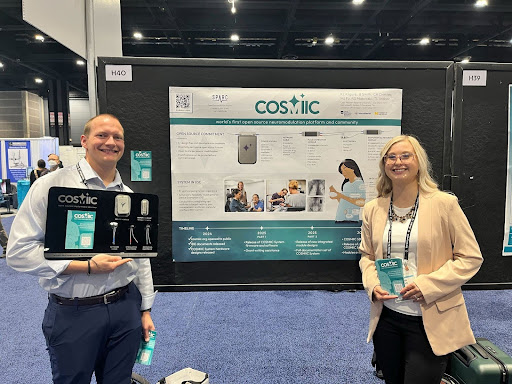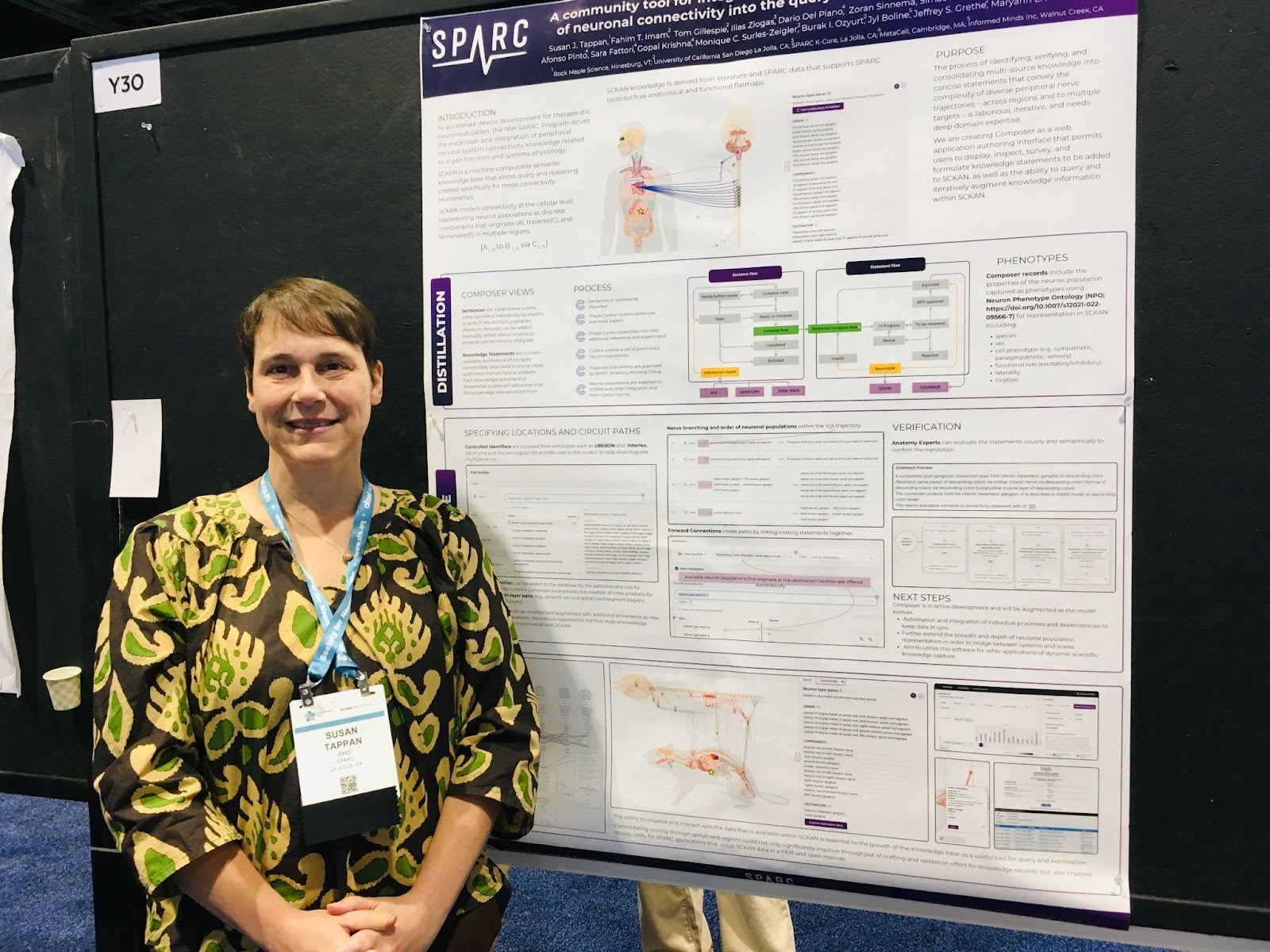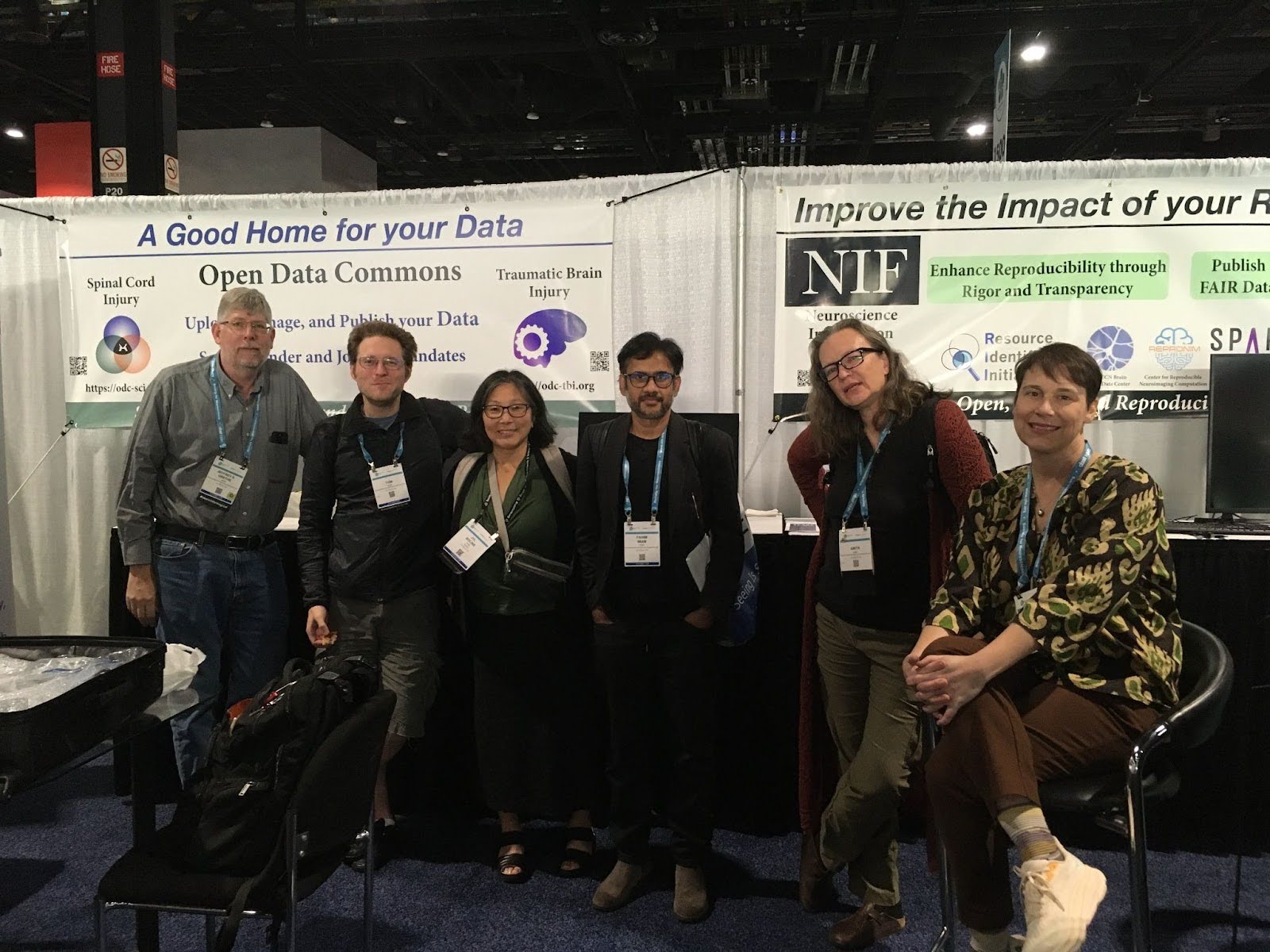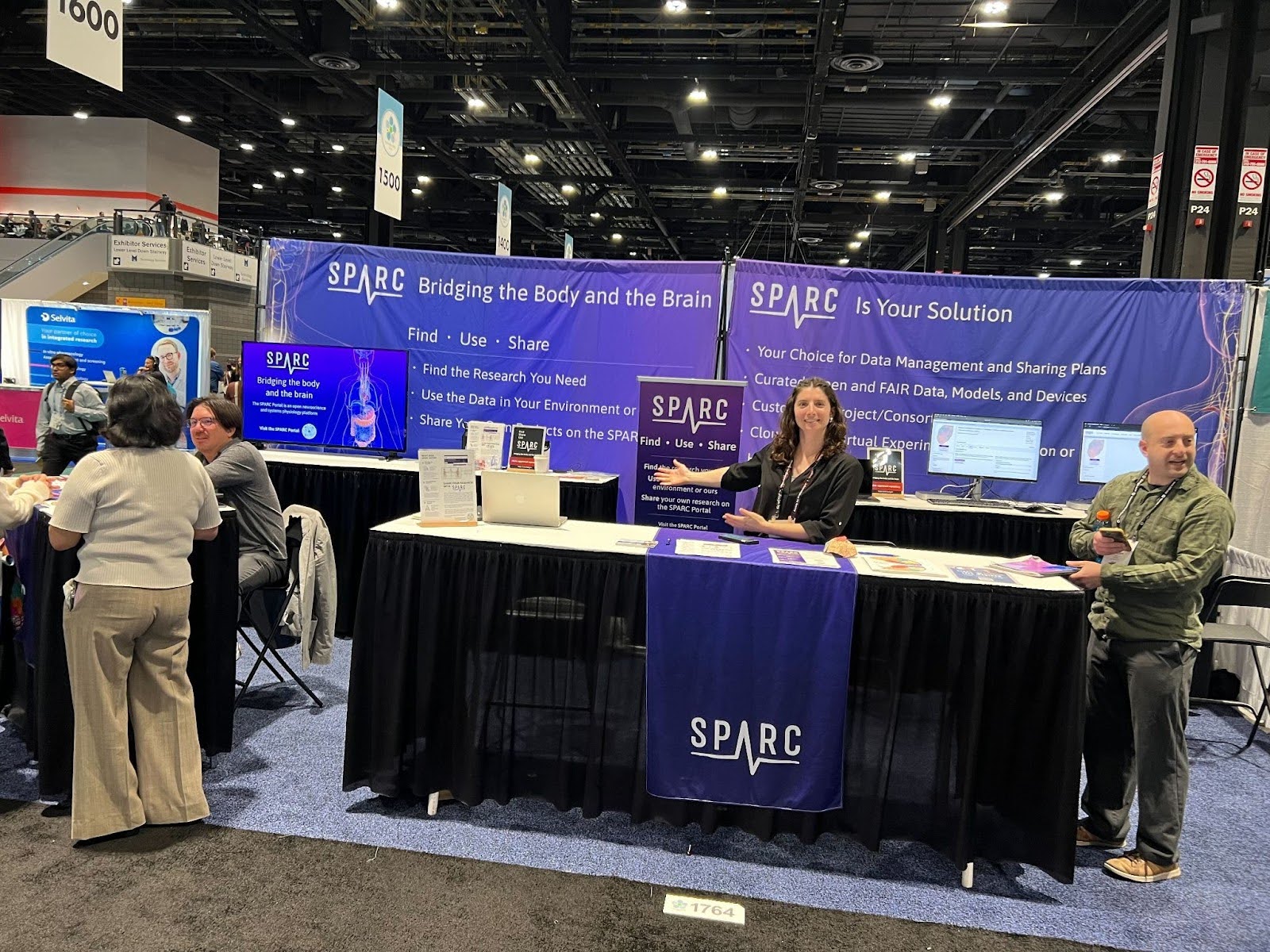SPARC Plug Autumn 2024
Originally published 2024/11/22

Click the above link, re-select newsletter issue from sidebar, then select desired language from above.
SPARC News
SPARC Portal publishes 315 datasets
As of August 2024, the SPARC Portal has reached a significant milestone, offering 315 datasets to researchers and the public. This extensive collection includes 226 research datasets, 49 computational models, and 40 anatomical models.
Over the previous quarter, the Portal expanded with 5 new research datasets, 4 computational models, and 2 anatomical models, underscoring our commitment to data accessibility. This steady influx of contributions supports SPARC’s mission of providing diverse and valuable resources to fuel scientific discovery.
In the last quarter, the highlighted organs with the highest total number of datasets on the SPARC Portal were the vagus nerve (74 datasets), colon (67), bladder (26), stomach (56), and heart (59).
The Portal currently hosts a total of 324 scientific contributions, comprising 232 datasets , 46 anatomical models , and 46 computational models .
The organs with the highest number of datasets remain largely the same, with updated counts as follows: the colon has 68 datasets, the vagus nerve 74, the stomach 57, the heart 59, and the bladder 26.
SPARC was at SfN
The Society for Neuroscience (SfN) annual meeting was held October 5-9 in Chicago, IL. This conference provided an excellent opportunity for SPARC to engage with the neuroscience community both at the booth and while presenting at least 22 posters featuring SPARC research. As the largest gathering of neuroscience professionals, attracting nearly 20,000 attendees from around the world, SfN aligns with SPARC’s mission to continue innovating to support data sharing and open science.

COSMIIC poster presentation

SPARC poster presentation

The SPARC DRC staff from K core

SPARC exhibitor booth at SfN
Focus on Pain Awareness in September
SPARC participated in Pain Awareness Month in September. This annual initiative aims to explore the full extent of pain, highlight the necessity for better data, and raise awareness about pain research and its impact on the 51.6 million Americans living with chronic pain.
SPARC’s contributions to the initiative included
-
The PRECISION team published three datasets, including
-
SPARC partner RE-JOIN published its first consortia manuscript in the current issue of Neurobiology of Pain, entitled
Knee and jaw pain experts collaborated to create standardized pain measures for joint pain. These measures can be included in the HEAL Common Data Elements for any study focusing on joint pain, allowing for harmonized datasets across studies.
SPARC Partner CARSS shares their story: Accelerating bioelectronic medicine with open source medical devices
Bioelectronic medicine is a rapidly growing field which uses neuromodulation of peripheral nerves to treat conditions involving disorders in cardiovascular control, gastrointestinal motility, immune response, and other autonomic processes.
The Center for Autonomic Recording and Stimulation Systems (CARSS) is working to overcome the major barriers of high cost and resources necessary to build human-grade devices. CARSS is a partnership between the University of Southern California and two medical device companies, Med-Ally LLC and Medipace Inc., to develop open-source devices for neuromodulation. CARSS is composed of researchers, medical device engineers, and contract manufacturers with experience in animal studies and clinical trials.
With support from SPARC, CARSS is developing OpenNerve, a flexible and powerful open source device for bioelectronic medicine designed to enable testing of new therapies in both animal (and soon) human research.
Read the SPARC Success Story here
Funding Opportunities
The Christopher & Dana Reeve Foundation and Spinal Research have partnered to fund pre-clinical research applications on paralysis caused by traumatic spinal cord injury. A critical step in the translational pipeline is that between discovery/initial proof of concept and Investigational New Drug (or Investigational Device) enabling studies, and there is a dearth of funding for such studies. The RFA encompasses early preclinical to translational research to support pre-IND or pre-IDE studies in traumatic SCI.
Letters of intent due: December 12, 2024, 5PM ET
Title: Mission Office-specific Innovative Solutions Openings (ISOs)
- Agency/Organization: Advanced Research Projects Agency for Health (ARPA-H)
- Expiration: Varied
- Link: https://arpa-h.gov/research-and-funding/mission-office-iso
Title: HEAL Initiative: Understanding Individual Differences in Human Pain Conditions (R01 - Clinical Trial Optional)
- Agency/Organization: National Institutes of Health (NIH)
- Expiration: Feb 7, 2025
- Link: https://grants.nih.gov/grants/guide/rfa-files/RFA-NS-25-020.html
Title: Developing Regulated Therapeutic and Diagnostic Solutions for Patients Affected by Opioid and/or Stimulants use Disorders (OUD/StUD) (R41/R42 Clinical Trial Optional)
- Agency/Organization: National Institutes of Health (NIH)
- Expiration: Feb 15, 2025
- Link: https://grants.nih.gov/grants/guide/rfa-files/RFA-DA-24-038.html
Title: HEAL INITIATIVE: Development of Therapies and Technologies Directed at Enhanced Pain Management (R43/R44 Clinical Trial Not Allowed)
- Agency/Organization: National Institutes of Health (NIH)
- Expiration: April 5, 2025
- Link: https://grants.nih.gov/grants/guide/rfa-files/RFA-NS-23-006.html
Title: HEAL Initiative: Interdisciplinary Team Science to Uncover the Mechanisms of Pain Relief by Medical Devices (RM1 Clinical Trial Optional)
- Agency/Organization: National Institutes of Health (NIH)
- Expiration: June 10, 2025
- Link: https://grants.nih.gov/grants/guide/rfa-files/RFA-NS-23-028.html
Title: BRAIN Initiative: New Technologies and Novel Approaches for Recording and Modulation in the Nervous System (R01 Clinical Trial Not Allowed)
- Agency/Organization: National Institutes of Health (NIH)
- Expiration: Jan 21, 2026
- Link: https://grants.nih.gov/grants/guide/rfa-files/RFA-NS-25-018.html
Title: Notice of Special Interest (NOSI): Promoting Data Reuse for Health Research [NOT-OD-24-096]
- Agency/Organization: National Institutes of Health (NIH)
- Expiration: Nov 4, 2026
- Link: https://grants.nih.gov/grants/guide/notice-files/NOT-OD-24-096.html
NIH News
COSMIIC Investigators Secure DoD Award
We are excited to share that COSMIIC investigators recently secured a 4-year, $3.9 million Department of Defense (DoD) Spinal Cord Injury Research Program Clinical Trial Award (#SC230198) to use COSMIIC platform technology to improve walking and independence after incomplete spinal cord injury. Learn more about the award here.
NIH Data Sharing Index (S-index) Challenge
This Challenge is designed to incentivize excellence in data sharing by introducing a new metric to assess how effectively researchers make valuable data accessible, fostering a culture of openness in science. With a total of $1,000,000 in cash prizes, Phase 1 opens on April 21, 2025, at 5:00 AM PDT. Learn more about the challenge here.
Conferences
NANS 2025
January 30-February 1, 2025, Orlando, FL
The North American Neuromodulation Society (NANS) links patients, physicians and health care professionals, scientists, engineers, and industry to advance neuromodulation, drive multidisciplinary collaboration, enhance therapy awareness and inspire innovation to transform patients’ lives.
Find more information on NANS 2025 Annual Meeting here.
Abstract submission for NANS 2025 is closed.
Presenting? If your peripheral nervous system abstract is accepted by SfN, let us know! We would love to see it. Send to [email protected]!
The Sixth BEM Summit: Neurotechnologies for Individuals and Communities
March 4-5, 2025, Garden City, NY
The Sixth Bioelectronic Medicine Summit: Neurotechnologies for Individuals and Communities will be held from March 4-5, 2025 at The Garden City Hotel, NY. This in-person event will feature leaders in the field discussing the latest advancements in bioelectronic medicine, including personalized therapies and scalable solutions for broader impact. Attendees will explore how neurotechnologies are shaping the future of healthcare for individuals and communities.
Call for Poster Submissions: The Feinstein Institutes for Medical Research and the University of Minnesota invite submissions on innovative work in bioelectronic medicine, focusing on advanced technology for treating disease and injury.
The summit is hosted by Dr. Stavros Zanos, Co-Host of the Sixth Bioelectronic Medicine Summit 2025, Head of Translational Neurophysiology Lab, Institute of Bioelectronic Medicine, Feinstein Institutes for Medical Research and Dr. Hubert Lim, Co-Host of the Sixth Bioelectronic Medicine Summit 2025, Earl E. Bakken Medical Device Center, University of Minnesota.
Find more information on The Sixth BEM Summit call for posters here.
- Deadline: December 13, 2024
- Decisions: January 10, 2025
Three posters will be nominated for the scientific committee by January 24, 2025.
American Physiology Summit
April 24-27, 2025, Baltimore, MD
Held annually by the American Physiological Society (APS), the Summit convenes thousands of life science researchers, educators and students from around the world. Join your vibrant, diverse community to celebrate and share the discoveries impacting the research community and the world around us.
Abstract submission for APS 2025 is now open!
- Deadline: Submit your research by December 2nd. Don't miss out!
Presenting? If your peripheral nervous system abstract is accepted by SfN, let us know! We would love to see it. Send to [email protected]!
MN Neuromodulation Symposium: Future Directions of Neuromodulation
May 1-2, 2025, Minneapolis, MN
This two-day event will feature a comprehensive program with a special focus on the future of neuromodulation.Conference topics will include the non-invasive neuromodulation, neuromodulation for immune health and challenges in autonomic neuromodulation. Future opportunities with AI and lived experience perspectives will be presented. Mark your calendar!
Find more information on MN Neuromodulation Symposium here.
- Registration and poster submission opens February 1.
New Webinars Available
Open Science Drives Discovery
Open science is changing the future of neuroscience! Learn how initiatives like SPARC are accelerating research & driving new treatments in this recent webinar featuring Sue Tappan and Ben Dichter.
How you can help
Help Shape the SPARC Portal
We want you to influence the continuous improvement of the SPARC Portal. Your participation in our UX research and design activities will make the Portal easier to use. We encourage everyone to get involved.
Join our UX Panel at [email protected]
SPARC DRC Open Office Hours
Join one of our weekly office hours to ask questions and learn more from the SPARC Data Resource Center Team. Find out more about our office hours on the SPARC Help Center.
Share with SPARC
Whether you are an individual researcher, manage a program or a project funder interested in the peripheral nervous system, consider sharing your data on SPARC. Find out more about sharing on the SPARC Portal.
Updated 3 months ago
**Not signed up? ** Don't miss out on our next issue of SPARC Plug! Subscribe to our mailing list today to receive the quarterly newsletter and other important announcements.
